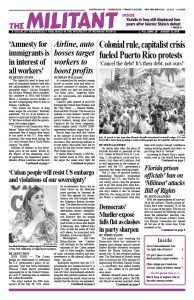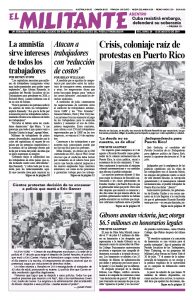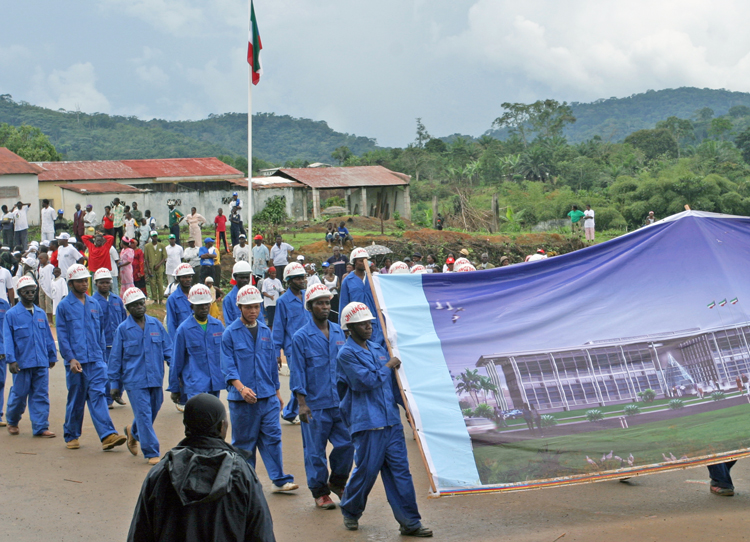The selection below is from Capitalism and the Transformation of Africa: Reports from Equatorial Guinea by Mary-Alice Waters and Martín Koppel. The title is one of Pathfinder’s Books of the Month for August. The two authors visited the country in 2005 and 2008, seeing firsthand both the accelerating changes and the impact of revolutionary Cuba’s internationalist volunteers there. The book draws on their interview with President Teodoro Obiang Nguema in 2008. Excerpts are from the chapter “Transformation of Production and Class Relations Highlights Realities Facing Millions in Africa.” Copyright © 2009 by Pathfinder Press. Reprinted by permission.
Equatorial Guinea, a former colony of Spain, is one of the smallest countries in Africa, both geographically and in population. Until a decade and a half ago, it was also what President Obiang called “the poorest of the poor”— one of the least economically developed regions on this continent. There were few paved roads, electrification was largely a dream, there was virtually no industry — even light manufacturing — and land cultivation was subsistence agriculture. There was no modern bourgeois class structure — no rising class of risk-taking merchants, factory owners, and landowners, no wageworkers or peasantry. The legacy of centuries of colonial and imperialist domination maximized the hobbling and great unevenness of the country’s social relations and economic structure.
Then, in the mid-1990s, vast reserves of oil and natural gas were discovered deep beneath the country’s offshore waters in the Gulf of Guinea. …
Within a few years’ time, one of the world’s most capital-intensive, technologically complex, and highly monopolized industries has been superimposed on a foundation in which the existing productivity of labor is a product of millennia of hunting, fishing, and subsistence agriculture, distorted by centuries of slave trading and colonial domination. …
Returning to Equatorial Guinea after several years, we noted four striking developments above all: the changing class relations and composition of the working class here, with workers drawn from around the world; the resources going into development of the economic infrastructure; the expansion of the system of higher education; and the spread of these developments throughout all parts of the country.
These changes and the contradictions they engender — revolutionizing conditions of life for many — underscore realities facing millions in large parts of Africa today. …
[I]n less than fifteen years the exploitation of oil and natural gas reserves has turned Equatorial Guinea into the third-largest oil exporter in sub-Saharan Africa, after Nigeria and Angola. “It is U.S. companies that are operating the offshore extraction operations, including ExxonMobil, Marathon, and Hess,” Obiang noted in the interview. Marathon also owns the liquid natural gas and methanol plants. In recent years, he added, “a number of other companies have signed agreements with [state-owned] Gepetrol, including Malaysian, South African, and Nigerian oil companies,” for joint exploration and development projects. China is the largest purchaser of the country’s oil.
Exploitation of Equatorial Guinea’s oil resources has accelerated the development of a modern class structure here in the urban areas. While tribal and clan ties continue to dominate social relations in the countryside, these preclass formations dissolve more and more with the increased penetration of the world market and capitalist relations of production.
As has happened in other parts of the world over the past five centuries, capital accumulation is today consolidating a capitalist class in Equatorial Guinea, with expanding private holdings in land, hotels, construction, transport, and other businesses. Through the purchase and exploitation of labor power, this rising class is extracting surplus value and expanding its wealth.
There are growing numbers of small traders, merchants, lawyers, and other petty-bourgeois layers. Drawn by the oil boom, this includes increasing numbers from West Africa, the Middle East, China, and other parts of the world.
A class of wageworkers is being born in Equatorial Guinea, too. As the Communist Manifesto noted about Europe and North America more than 150 years ago, “In proportion as the bourgeoisie, i.e., capital, is developed, in the same proportion is the proletariat, the modern working class, developed — a class of laborers, who live only so long as they find work and who find work only so long as their labor increases capital.”
Capitalist expansion inexorably draws growing parts of the world into its orbit, Karl Marx and Frederick Engels noted. Today capital is exerting its pull on Equatorial Guinea. Increasing numbers of Guineans are becoming wageworkers for the first time ever, as laborers on road and other construction projects especially. Nearly half the country’s population lives in Bata and Malabo, which are being swelled by stepped-up migration from the countryside of toilers seeking jobs.
The demand for labor has also led to a large influx of workers from abroad, especially from other parts of Central and West Africa — including Cameroon, Gabon, Burkina Faso, Mali, and Nigeria. Workers from Paraguay, the Dominican Republic, and elsewhere in Latin America have come to work in hotels, restaurants, and at other jobs. On all the construction sites we visited, most of the skilled workers and technicians are migrants from French-speaking African countries or contract employees from China, North Africa, Lebanon, Iran, and elsewhere.
As Obiang said in an August 5, 2008, speech to an audience that included many Guinean construction workers, “Equatorial Guinea used to be a country that was held in contempt.” Now, he said, “many are coming here in search of prosperity. We have more immigrants than other countries in Africa. It’s like bees who are coming to taste our honey.”
The growth of the working class and its increasingly international character—as workers bring their skills and experiences from other parts of the world—has increased the pride and confidence of working people here. It is widening their scope.


